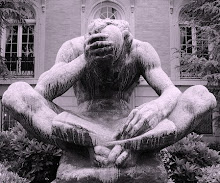I'm getting a cold, so I might be a bit more snarky than usual. Really.
When then-governor George W. Bush was campaigning for president in 1999, he was asked a question about the legality of medical marijuana use--and the federal government's role in policing its use. He said: "I believe each state can choose that decision as they so choose." That didn't last very long. By 2003, Doug Bandow at the conservative National Review was lamenting the disconnect between what Bush said and what he did on this issue.
In 2000 en route to winning the South Carolina primary, Mr. Bush said (try to ignore Tapper's obvious Northern provincialism) he thought "it's the people of South Carolina's decision." He continued: "If I may, I don't believe it's the role of someone from outside South Carolina and someone running for president to come into this state and tell the people of South Carolina what to do with their business when it comes to the flag....As an American citizen, I trust the people of South Carolina to make the decision for South Carolina." The decision he's talking about is, of course, whether or not the confederate flag should be displayed on the state's capitol building.
It's not just flags and pot. It's also gay marriage, on which he believed "the states can do what they want to do." But once he was in office, as politicians are wont to do, he changed his tune.
To be fair, these stances were outlined seven years ago, and politicians have the right to change their minds. Would we respect Jefferson Davis if he changed his mind about the Confederacy, but stuck to his guns because of a perceived political fall-out? Would we respect LBJ or Nixon if they'd changed their minds about the Vietnam war but kept on plugging away because they'd get eviscerated in the public media as flip-floppers? The very notion that we won't let politicians change their minds on issues is ridiculous; they need to be able to admit mistakes and to admit they are people and can change their minds when new and different information comes to their attention.
But the shifts in President Bush's administration positions I've just briefly outline are symptomatic of a larger policy shift--a shift away from his platform outlined in 2000. This was firmly based on Republican reform ideas: 1) "We’re coming to understand that a good and civil society cannot be packaged into government programs"; 2) "The leadership our governors have shown in these matters only strengthens our commitment to restore the force of the Tenth Amendment, the best protection the American people have against federal intrusion and bullying....The dramatic success of welfare reform — once the States were allowed to manage their programs — is a stellar example of what happens when we give power back to the people....Therefore, in our effort to shift power from Washington back to the states, we must acknowledge as a general matter of course that the federal government’s role should be to set high standards and expectations in policies, then get out of the way and let the states implement and operate those policies as they best know how. Washington must respect that one size does not fit all states and must not overburden states with unnecessary strings and red tape attached to its policies."
That institutes an overall policy declaration, not just specific campaign promises. But apparently, the rights of states to make decisions for themselves is an issue only when a Democrat is in the White House. (As SNL's Churchlady might say, "How conveeeeeeeeeeeeeeeenient!") No longer does Mr. Bush and the Republican administration back state's rights. None too secretly, there was a sea change in the Bush administration's actions: it has continually sought to grow government agencies, add government agencies, and expand presidential power. And now, this (click link to read entire article):
State to sue U.S. to allow tailpipe rules by Marc Lifsher, Los Angeles Times , October 20, 2007
California will sue the Bush administration next week in a bid to force the Environmental Protection Agency to allow the state to issue greenhouse gas regulations for automobiles.
The lawsuit, which would make good on a threat made six months ago by Gov. Arnold Schwarzenegger, will demand that federal regulators give California a waiver under the U.S. Clean Air Act, as they've done dozens of times for similar air pollution controls.
A waiver would allow California to require automakers to cut emissions of carbon dioxide and other greenhouse gases by 30% between 2009 and 2016 -- as mandated by a law the state passed in 2002.
The suit is aimed at getting the attention of President Bush and Congress. "It is highly significant that the most trumpeted Republican governor in America feels it's absolutely necessary to sue the Bush administration in order to defend California's rights to protect the environment," said Atty. Gen. Jerry Brown, who will represent California in court.
Automakers oppose the waiver request as well as the regulations, and they are fighting the California law in a complaint before a federal judge in Fresno.
What happened to the rights of the governors--especially those Republican governors so touted in Mr. Bush's 2000 platform--to do what works for their states? What about the federal government getting out of the way? It's not just Democratic-controlled governments that get in the way. California is having to fight the Environmental Protection Agency (and, indirectly, the automakers) just to protect its own environment! Nice one.
Subscribe to:
Post Comments (Atom)

No comments:
Post a Comment